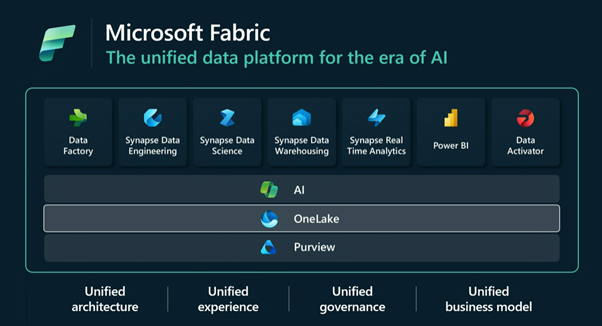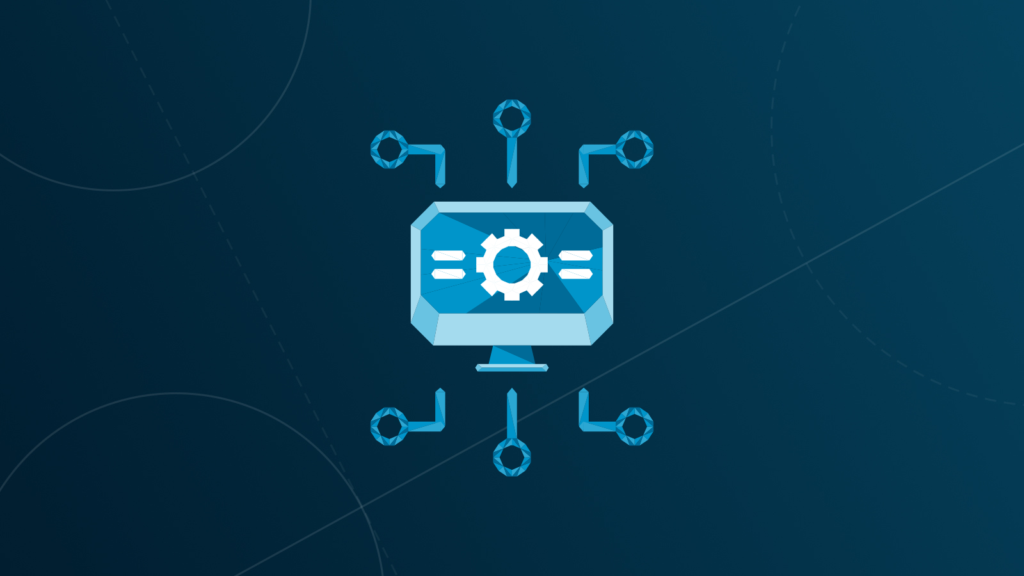
In today’s data-driven world, businesses across various industries face the challenge of managing, integrating, and analysing vast amounts of information efficiently and securely. Fail to do so, and you fall behind.
With Microsoft Fabric, you unlock the full potential of your data and join industry-leading companies in making the most of its transformative data management capabilities. Your teams will benefit from a comprehensive, integrated solution that is easy to understand, onboard, create, and operate, and create a seamless data management platform that allows for smoother collaboration, greater productivity, and enhanced innovation across departments.
Sounds great, doesn’t it? That’s because it is, but there’s a lot more to learn in order to get the ball rolling.
Firstly, what is Microsoft Fabric?
Microsoft Fabric stands as a comprehensive solution tailored for data integration, data engineering, real-time analytics, data science, and business intelligence, all while maintaining stringent data privacy and security protocols.
Fabric simplifies the entire data workflow by combining several powerful tools –Data Factory, Synapse Analytics, Data Explorer, and Power BI –into a unified, cloud-based platform. This integration allows for seamless data movement, robust data engineering, and advanced analytics, all within a single, user-friendly interface.

Exploring Microsoft Fabric Features
Fabric is packed to the rafters with features than unlock innovation and empower your organisation. We’ve hand-picked those that we have seen be particularly impactful, but there’s load more to learn about on Microsoft’s website.
Streamline Your Data Solutions
With Fabric, there is no longer a need to piece together multiple datasets, analytics, and BI solutions to get the business insights you require. This unified Software as a Service (SaaS) platform offers a single source of truth for all your data and analytics, offering secure and democratised insights. Utilising this powerful, open, and scalable solution will accelerate your time to value through effective cost management and spend optimisation, giving you the biggest bang for your buck.
Copilot integration
Fabric and Copilot go hand-in-hand, leveraging the power of AI to enhance data workflows across its suite of tools. This integration provides users with advanced capabilities for data processing, analytics, and visualisation, making data management more intuitive and efficient.
A Unified Experience
By integrating Data Factory, Synapse Analytics, Data Explorer, and Power BI into a seamless, cloud-based experience, Fabric provides a single pane of glass for data management. The open and governed Data Lakehouse foundation provides a cost-effective, performance-optimised fabric for business intelligence, machine learning, and AI workloads at any scale. It is the ideal foundation for migrating and modernising existing analytics solutions, whether these are data appliances or traditional data warehouses.
For New and Growing Analytics Customers
Fabric’s SaaS environment facilitates the rapid deployment of a complete end-to-end analytics engine from scratch. With its built-in security and governance capabilities, you can rest assured that your data and insights are well protected, even when you accelerate the creation or expansion of your analytics estate. Fabric allows you to get up to speed quickly, to keep pace with your competitors.
For Existing Synapse Customers
The next evolution of Synapse is here – as part of Fabric. Enjoy the limitless scale and benefits of Synapse in an easier-to-use SaaS solution, while adopting new capabilities that enhance your entire analytics approach. With the addition of Power BI, you can democratise the ability to uncover insights and create interactive reports across your organisation, empowering everyone to make more data-driven decisions in their everyday work.
For Existing Power BI Customers
Lastly, Fabric gives you access to powerful data tools and services like Azure Synapse within the familiar Power BI user experience. Unify these tools with your disparate data sources in the same environment to establish a single source of truth for all data, driving the ability for everyone to uncover more accurate and consistent insights. Additionally, the built-in security and governance capabilities ensure your data is protected, eliminating the security concerns associated with a patchwork analytics estate.
How can Fabric be used for your industry?
No matter what sector you work in, Fabric has the ability to transform your work.
Heathcare sector
The healthcare industry is riddled with complex data challenges, as it handles massive amounts of highly sensitive and highly regulated information.
As part of the NHS’s digital transformation plan, Electronic Heath Records (EHR) have become critical to medical professionals. EHRs show patients’ vital information, lab results and observation notes, and are a powerful tool for medical professionals as they can quickly diagnose those who are high risks for certain conditions, such as sepsis.
Fabric allows for an improved patient experience by giving healthcare organisations immediate access to structured and unstructured medical data in OneLake, laying a foundation that enables healthcare professionals to run analytics to identify patient needs in real-time.They can also leverage real-world data collected by clinical drug trials, using machine learning and artificial intelligence coupled with large sets of genomic and population data to gain new insights into drug efficacy. Healthcare providers will also be empowered to collaborate more closely by being able to securely share and access patient data and insights.
Finance and Insurance sector
The Financial Services Industry is heavily regulated, making the security of Microsoft products particularly valuable. Microsoft Fabric provides FSI professionals with secure, governed access to customer portfolio and market data, which allows them to enhance customer lifetime value and loyalty by offering a comprehensive view of a customer’s financial situation, facilitating targeted upselling and cross-selling of products and services tailored to the needs of individual clients.
For insurance firms, Microsoft Fabric supports improved risk assessment through analytical models on aggregated data. Insurance specialists can gain improved insights by integrating internal and external data, enabling them to offer customised solutions to their clients.
Overall, FSI organisations can leverage Fabric to ensure regulatory compliance, enhance customer experiences, and identify new revenue opportunities. It’s an FSI game-changer.
Public sector
For most government agencies, data is scattered from pillar to post. It cannot be accessed digitally, and it is not easily digestible. That all changes with Microsoft Fabric, where customers will be able to collect and store data in one single cloud location.
Government agencies will now be able to combine research and data across the public health sector and use machine learning and artificial intelligence to identify health risks and trends., leverage data to drive improved urban planning by offering better services and experiences, and stream data from IoT sensors and public utilities/transportation machinery can be ingested in OneLake with IoT Hub, for real-time analysis.
Retail Sector
Retailers face their own set of unique challenges when it comes to data. They often struggle with closing the gap between online and physical stores, integrating data in a meaningful way, and efficiently managing supply chains. With Microsoft Fabric, they can leverage real-time data to inform their merchandising strategy, leveraging customer data to learn what target audiences value and curating personalised shopping experiences.
Retailers can also optimise digital spend by creating models that identify who and where to target buyers based on data trends, while tracking store activity by ingesting real-time data from in-store sensors and cameras will identify even more in-person areas for optimisation.
Lastly, and most likely top-of-mind for many retailers, is being empowered to deliver an intelligent supply chain. By using data to anticipate customer demand on a local and global scale, retailers can get the right product, at the right price, to the right customer, at the right time – closing the gap between demand and fulfilment.
Manufacturing
The manufacturing sector generates vast amounts of data from sensors, machinery, enterprise systems, and human interactions. However, much of this data remains isolated, unstructured, and underutilised, restricting the potential for leveraging data-driven insights and fostering innovation.
Microsoft Fabric enhances manufacturing operations by integrating data from various sources into its unified platform, enabling real-time analytics and insights that allows manufacturers to monitor production processes continuously, optimise schedules, and perform predictive maintenance to reduce downtime and improve product quality. Advanced AI-driven tools facilitate better decision-making and operational efficiency, leading to cost reduction and increased productivity, and the cloud-based infrastructure of Fabric ensures scalability and flexibility, adapting to changing production needs and supporting long-term growth.
So, what’s next?
Many businesses are eager to revolutionise their data management and deploy Microsoft Fabric – but it’s important to understand how each solution can be tailored to your specific business needs before taking the leap.
We have an interactive workshop designed for you to understand exactly how you can adopt Fabric. Led by our Cloud Evangelist, Leon Godwin, this workshop is a two-way open discussion where you can build your business case and learn what your next steps should be.
Register your interest here, and let’s get your data journey started.




